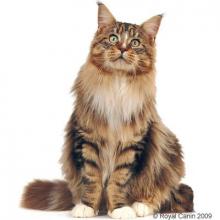Our first November focus is Feline Heart Disease.
Feline heart disease, specifically hypertrophic cardiomyopathy (HCM) can effect any cat, but is genetically predisposed to Maine Coon's, Ragdoll's and other breeds. However, if undiagnosed, hyperthyroidism and hypertension (high blood pressure) are well known to cause similar heart changes.
HCM is characterised by a thickening of the muscle of the left ventricle, leading to abnormal relaxation and reduced stroke volume, causing the heart to pump harder to maintain its output. The effect of which is to increase oxygen requirement of the heart muscle, leading to reduced heart function and possible arrhythmias (abnormal rhythm). A result of less efficient blood pumping causes a backup of blood to the other chambers of the heart and to the lungs, which contribute to the progression of congestive heart failure or the formation of blood clots. The atrium can also stretch as a result of HCM, allowing clots to form within the chamber which may then pass around the body and lodge in the lungs or femoral (hindleg) arteries.
Often cats will show no outward clinical signs and be completely asymptomatic until congestive heart failure occurs. One study found 40% of cats treated for hyperthyroidism had heart changes when scans were carried out, another study found 15% of ‘normal cats’ had HCM changes when screened, which makes it quite a prevalent disease. This is why a conscious ultrasound scan of cats with heart murmurs or hyperthyroidism is highly recommended and very worth discussing with your vet at the senior cat clinic.
To discuss this further, please do not hesitate to contact us on 01363 772860.


